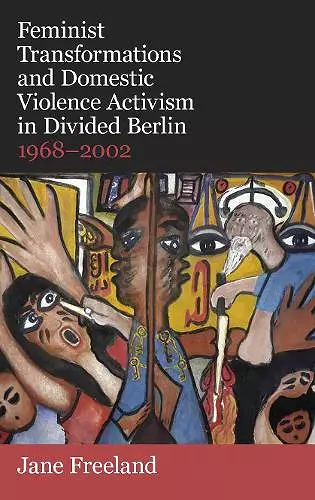Feminist Transformations and Domestic Violence Activism in Divided Berlin, 1968-2002
Format:Hardback
Publisher:Oxford University Press
Published:10th Nov '22
Currently unavailable, and unfortunately no date known when it will be back
This hardback is available in other editions too:
- Hardback£72.00was £80.00(9780197264546)
- Hardback£90.00was £100.00(9780197264522)
- Hardback£85.50was £95.00(9780197265802)
- Hardback£76.50was £85.00(9780197267066)
- Hardback£85.50was £95.00(9780197267257)
- Hardback£63.00was £70.00(9780197267301)
- Hardback£67.50was £75.00(9780197267226)
- Hardback£81.00was £90.00(9780197260296)
- Hardback£90.00was £100.00(9780197260272)
- Paperback£18.00was £20.00(9780197261002)
- Hardback£63.00was £70.00(9780197260920)
- Paperback£15.29was £16.99(9780197260760)
- Hardback£72.00was £80.00(9780197261132)
- Hardback£40.50was £45.00(9780197258576)
- Hardback£94.50was £105.00(9780197266892)
- Hardback£67.50was £75.00(9780197267264)
- Hardback£54.00was £60.00(9780197266748)
- Hardback£97.20was £108.00(9780197267431)
- Hardback£81.00was £90.00(9780197267400)
- Hardback£85.50was £95.00(9780197267417)
- Hardback£76.50was £85.00(9780197267387)
- Hardback£63.00was £70.00(9780197267424)
- Hardback£90.00was £100.00(9780197267462)
- Hardback£81.00was £90.00(9780197267493)
- Hardback£90.00was £100.00(9780197267509)
- Hardback£63.00was £70.00(9780197267486)

This is the first in-depth historical study of feminist activism against domestic violence in divided Berlin between 1968 and 2002.
Starting in the 1970s, feminists in West and then East Berlin campaigned against domestic violence as a key issue of women's inequality. They exposed the harmful gender norms that left women unprotected and vulnerable to abuse in the home and called for this to change. Indeed, domestic violence has been one of the issues most effectively addressed by the women's movement in Germany. Since the first shelter opened in West Berlin in 1976, women's shelters have spread throughout the country, and today up to 45,000 women a year turn to emergency housing in Germany, with many more accessing helplines and crisis centres.
Situating domestic violence activism within a broader history of feminism in post-war Germany, Feminist Transformations traces the evolution of this movement both across political division and reunification and from grassroots campaign to established, professionalised social service. In doing so, it brings the histories of feminism in East and West Berlin together for the first time and explores how feminism successfully changed women's rights in Germany.
But it also asks what popular and political support for domestic violence activism has meant for feminism and the advancement of women's rights more broadly. Examining the trajectory of feminism in Germany, Jane Freeland reveals the limitations of gender equality as advancements in women's rights were often built on the reassertion of patriarchal gender roles.
Feminist Transformations and Domestic Violence Activism in Divided Berlin is an urgent intervention in both the history of postwar Germany, and the history of feminism. Jane Freeland is breaking new ground, both in her evaluation of the impact of feminism on the mainstream political agenda, and her nuanced assessment of how the movement was changed in the process. Her integration of activism in East Berlin, before and after the Wende, expands our understanding of feminism in exciting and important ways. We need more work like this! * Josie McLellan, University of Bristol *
Feminist Transformations deserves a wide readership among historians of divided and reunified Germany, as well as among scholars of feminism more broadly. * Lauren Stokes, Europe Now *
ISBN: 9780197267110
Dimensions: 240mm x 160mm x 20mm
Weight: 524g
240 pages